CMP COLLEGIATE RIFLE TEAM FEATURE: University of Tennessee at Martin
May 18, 2021
Civilian Marksmanship Program▸College Connection▸CMP COLLEGIATE RIFLE TEAM FEATURE: University of Tennessee at MartinThroughout its history in the Ohio Valley Conference (OVC), the University of Tennessee at Martin has accumulated nearly 90 all-time postseason wins, including over 30 All-OVC air rifle honors, 24 All-OVC smallbore honors and more than 30 combined OVC All-Newcomer air rifle and smallbore honors. The team has also cultivated six at-large participants in the NCAA Championships, two OVC air rifle MVP athletes and six OVC Freshmen of the Year.
Before the Skyhawks came under the direction of current head coach MJ Vowell, the team was led by coach Bob Beard for over 30 years. Beard is the longest-tenured member of the UT Martin athletics department and was inducted into the UT Martin Athletics Hall of Fame in 2014. During his time as coach, Beard earned five OVC Coach of the Year titles. A member of the United States National Guard shooting team for 12 years and a Hall of Fame rifle athlete at Murray State University, Beard now acts as a volunteer assistant coach for the UT Martin Skyhawks.
Head Coach:
Name: MJ Vowell
Hometown: Louisville, Kentucky
Were you a shooter before coaching? If yes, what were some of your accomplishments? If no, how did you become a college coach for rifle? Yes, I shot at UT Martin under coach Bob Beard (1985-88). I was the Kentucky State Games Air Rifle Champ (1988) and a member of the U.S. Army Marksmanship Unit – CISM Women’s team (1988, ‘91, ’92, ’93).
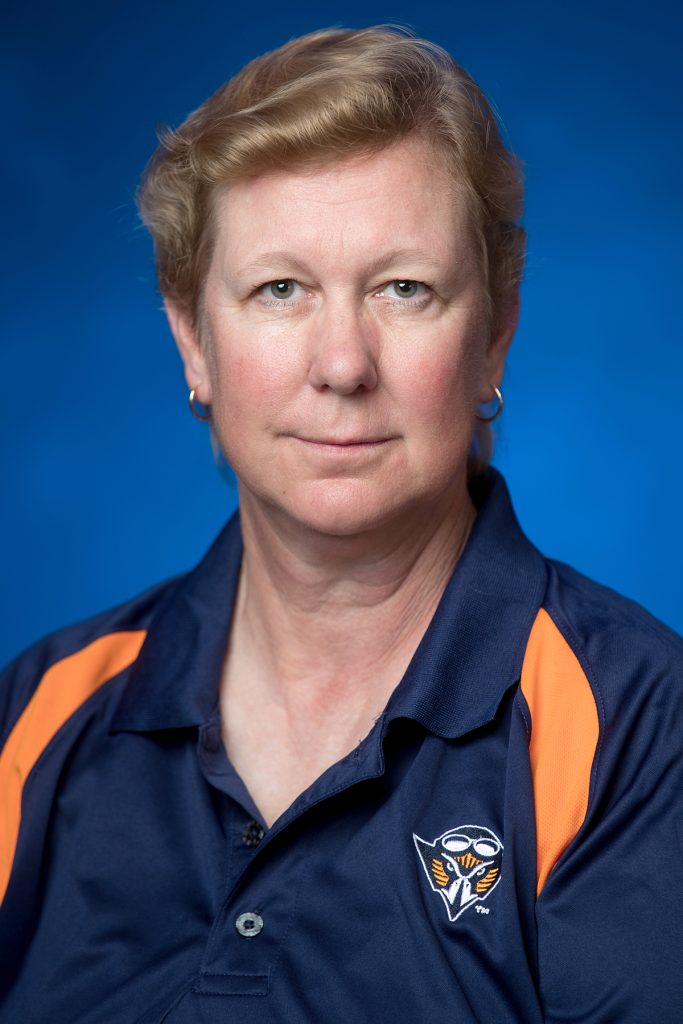
Favorite reason for coaching: Having the opportunity to give back to the program that gave me so much.
What is a day as your shooter like? We get up early! Practice begins at 6 a.m. I get the team on the firing line with fresh, uncluttered minds (hopefully). Once practice is done, they have the rest of the day to focus on academics and associated requirements.
What is your biggest challenge as a coach? During this year with COVID restrictions and protocols, hosting matches or traveling to matches required significant planning and coordination. The priority being, keeping the team as healthy as possible.
Advice for junior shooters wanting to compete in college and for college athletes and graduating college seniors? Junior Shooters: Seek out a local shooting club or a team at your school. Focus on the basics. Talk to other shooters and attend matches as much as you can to gain experience and confidence.
College Athlete: Set measurable and attainable goals in your shooting, but also in your field of study. Organize your time so that your focus and efforts produce the desired results, but also include some time in your schedule for doing something for yourself, such as a hobby, meditation, an outing with friends, etc.
Graduating Seniors: This is the day you have been working towards – the culmination of your college athletic years and your academic degree. Perhaps you will go on to Graduate School or go directly into the workforce. Either way, you don’t have to stop shooting. Get involved in a local club, attend a match and stay connected to friends you have made throughout your college journey.
Assistant Coach:
Name: Kaitlin Korinek
Hometown: Irwin, Pennsylvania
Were you a shooter before coaching? Yes, I was an athlete on the UTM rifle team for four years prior to assistant coaching. Some of my accomplishments include: OVC 2016-2017 co-freshmen of the year, eight OVC championship accolades over my four-year career and an at-large NCAA qualification in air rifle for the 2020 Championships. I have also earned two Collegiate Rifle Coaches Association Scholastic All-American awards, and I am a four-time OVC Commissioner’s Honor Roll recipient.
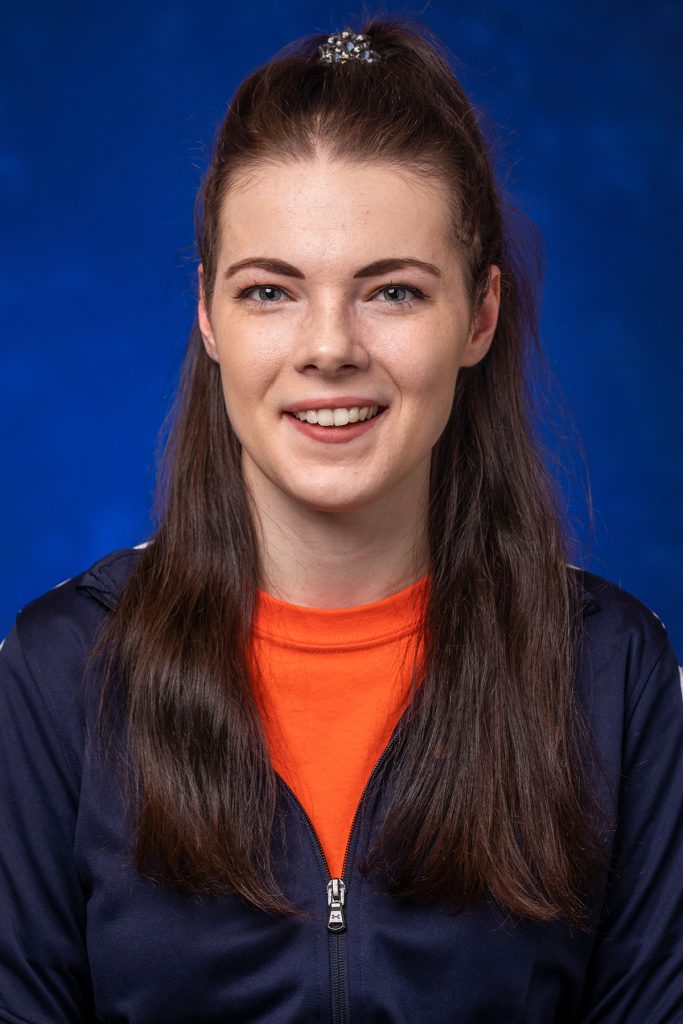
Favorite reason for coaching: I have really enjoyed giving back to the team. It’s my dream that I can help an athlete go beyond what I did in my career, and I hope to one day achieve that goal. The new perspective I have gained through coaching has helped me put together pieces as an athlete, and I enjoy applying these new strategies when I shoot in my spare time. I love helping athletes apply new knowledge to their technique as well. It’s such a great feeling to watch these athletes surpass their own personal goals.
What is a day as your shooter like? A typical day includes starting live fire practice at 0600. We usually personalize each practice for the specific athlete unless we are doing a drill, such as a match sequence, dry-firing shots or focusing on group size of a sequence of shots. We try to focus on each athlete’s weak points so they can build their skill level up. Some days, we also focus on mental training. After morning practice, they start their school day, and some do physical conditioning on their own time. I have given some athletes mental drills to do at home as well.
What is your biggest challenge as a coach? The biggest challenge for me as a coach is adjusting to not being a teammate anymore. I used to be shooting alongside most of these people, and now I have to do my best to give them advice and sometimes be their biggest critic. This team has made the transition easy though, as they respect my advice and opinions and are willing to try new techniques suggested to them. Often times, it can be frustrating to want to keep tweaking their position, but each shooter has their own technique. You also have to keep in mind that the shooter knows what is comfortable to them.
Advice for junior shooters wanting to compete in college and for college athletes and graduating college seniors?
For junior shooters: Do not be afraid to advocate for yourself. I had to be my biggest advocate for finding a collegiate team that wanted me to compete for them. Go to as many open and national matches as you can. Do not be afraid to email coaches either. Step outside of your comfort zone. I never thought I would end up so far from home in Tennessee, but now I’m calling this state my new home, thanks to my opportunity to shoot for UTM.
For college athletes: Enjoy your time in school. You will find friends that will last a lifetime, and focus on your academics! It is great to have some fun, but you can’t compete on an athletic team if you do not maintain your grades! Focus on your own personal growth and progress as an athlete. Do not worry about how other athletes are doing around you. You’ll be amazed how far you’ll go if you learn to compete against yourself. The most growth I’ve had as an athlete was during my college career.
For graduating college seniors: It’s okay if you still do not know what you are doing. I’m still figuring it out as well! Life is a big journey, and we are young. We have so much still to learn, but be confident with the knowledge you have gained thus far and use it to leave the world a better place than how you found it.
Any additional comments/stories/advice you’d like to add? Always keep an open mind. You may know a lot, but sometimes coaches and teammates will offer you advice you have never thought of, and when you try it, it works great! Sometimes it may not work, but it could still provide a foundation for you to build off of. So, don’t ever stop striving for greatness!
College Athlete:
Name: Kalen Royal
Hometown/Junior Team: Clarksville, Tennessee/West Creek High School
What is your major? Why? Favorite class? Civil Engineering. I have a lot of interest in the Design/Architectural field, and a degree in engineering specifically allows me to have many options. I enjoyed my AutoCAD class because I was able to have a hands-on experience with a program a lot of engineers use in their everyday work.
How old were you when you got involved in rifle? 14 years old
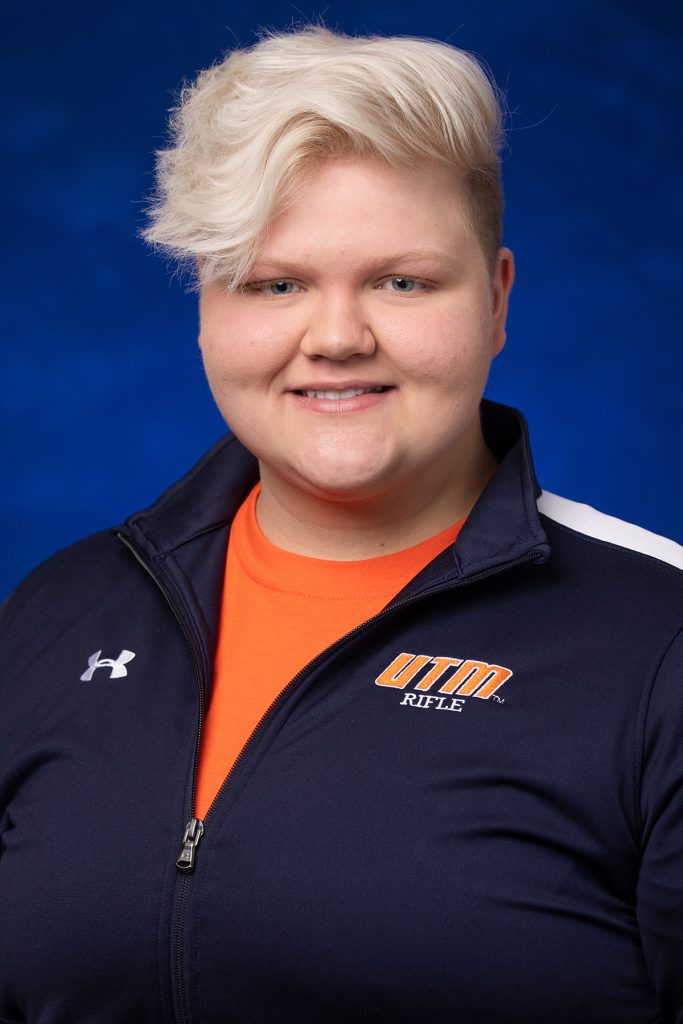
Favorite rifle (air rifle vs .22) and stage (kneeling, prone, standing)? .22 – I never shot smallbore until I got to college. So, having something new is exciting and makes for a fun new challenge to master. My favorite position is kneeling.
What do you do outside of rifle to train and better yourself (workout, meditate, etc)? Actively reflect on what I can do in my every day that would help improve my shooting, like eating good/healthy food, drinking lots of water, etc. I also actively work on my mental strength to help better my focus for when I’m on the line.
Future plans/goals for rifle and life? Retire from shooting when I graduate and to, hopefully, pick it back up and teach either my own family or a club. As for life, I want to graduate and find a good job.
Any additional comments/stories/advice you’d like to add? I started my shooting career in sporter, with an air rifle that you had to pump after every shot. My team had to build our target boards from scratch and carry them up two flights of stairs every day just to practice. I have worked hard to be where I am today, and I’m glad I had the opportunity to shoot for a collegiate level team.
College Athlete:
Name: Jennifer Plocinik
Hometown/Junior Team: Lehighton, Pennsylvania / Ontelaunee Junior Rifle Team
What is your major? Why? Favorite class? Civil Engineering. I have always been interested in building things and knowing how things worked. In high school, I was accepted into an engineering program at Lehigh University. It was about a week-long program where we were able to see different types of engineering. I actually was able to print off my own Lehigh crest from a 3D printer and made a bridge that would hold buckets of water. My bridge held for the longest time. My favorite class would be fluid mechanics. I found it interesting to study fluid behavior and the forces that act on them.
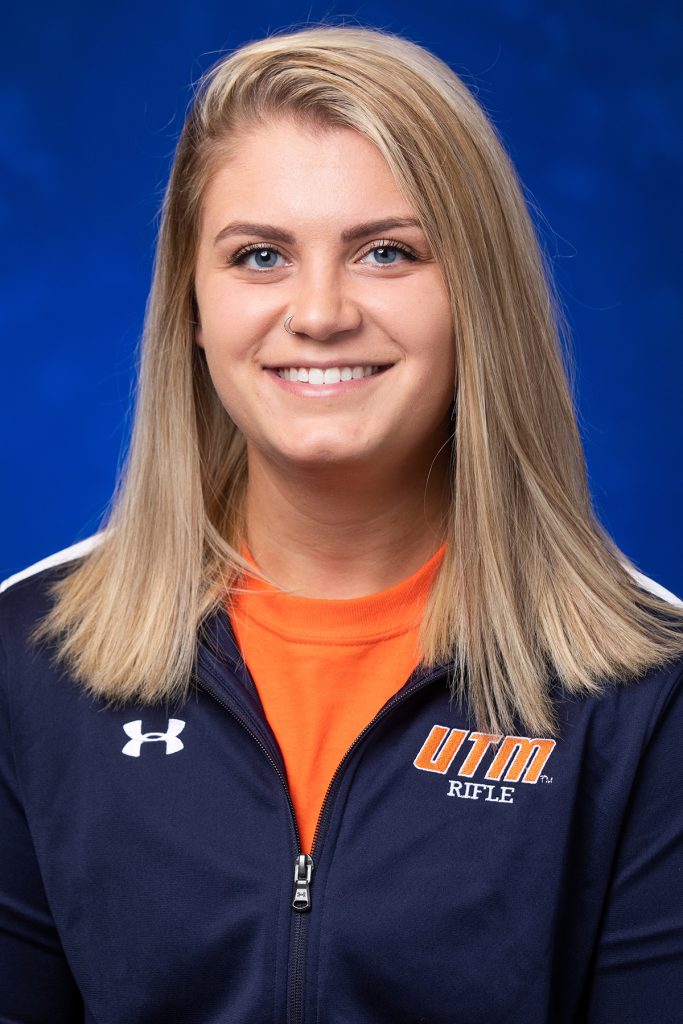
What other clubs/sports/hobbies did you have in high school? I was on the varsity soccer, softball and basketball team for about two years before I had to stop playing from so many concussions. So for me to stay busy, I became the manager for all the teams, and then that is when I started shooting. I was also in chorus and show choir.
Do you have a mantra or saying? What motivates you? I don’t really have one specific saying in my head when I am shooting. It is more like rhythms of confirmation for me of breathe, relax, shoot and follow through.
My parents motivate me. They are 12 hours away from me, and yet, they still come to every match that they can or even watch it online. I know they are always watching and that I’m making them proud, even if it is a bad day.
What is a travel match like for you? A travel day is exciting because we get to see a different experience at different ranges. I usually get up around 5 a.m. and get my mental game ready for the day. On the drive, I am always trying to envision my shots and focus on what I am seeing when I am looking down my sights at the 10-ring. I love that we get to represent our school when we travel, and it makes UTM stand out a little more in a positive way.
Advice for new competitors joining the sport? Don’t overthink, and have fun. I started not knowing anything about this sport. I just picked up a gun one day at our local gun club and started shooting. As I became more aware, I would overthink. I started that so early on that as I got older and kept shooting, it was a hard mindset for me to learn that every shot counts, but one shot will not define you, or your match or matches in the future.
Any additional comments/stories/advice you’d like to add? Remember that this sport is scored as a team, but your scores are what matter to you. If your team score was one point off from breaking a record, don’t punish yourself for not shooting that one 10 instead of a 9. It does not define you. Don’t think about your overall score. Think one shot at a time, because you can do this.
College Athlete:
Name: Jacob Osborne
Hometown/Junior Team: Richland, Mississippi
What is your major? Why? Favorite class? I am a Soil and Water Conservation major. I decided I didn’t want to be a wildlife biology major, and I want to become a land surveyor, but I could also work as a soil scientist for the state.
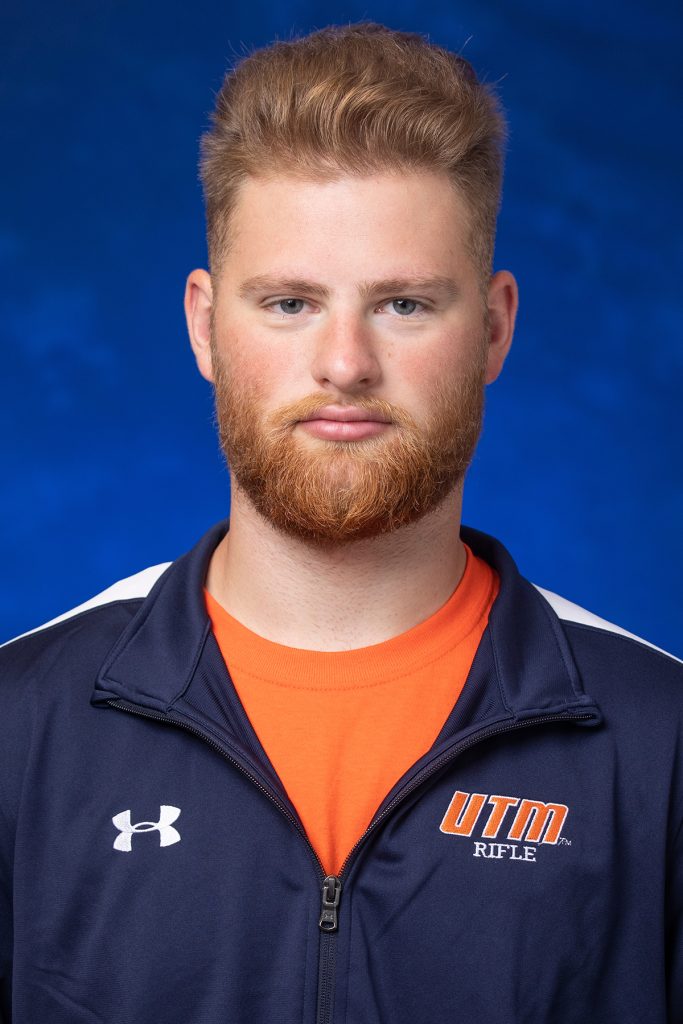
What/who got you involved in rifle? I have always shot guns from a very young age, but my mom encouraged me to talk to the JROTC instructor when I was in the sixth grade. He trained me all through high school.
How many hours a day, and days per week, do you practice? We practice for about an hour and a half, four days a week. But the most important part of practice is the workouts and mental training that I do outside the range.
What is a week at college like? A week at college can be extremely busy and stressful, like having five exams, work, studying, working out, practice and church – and trying to balance that type of schedule. Or, it can be very relaxing to where all I do is work, practice, church and hang out with friends. On the weekends, I am either just chilling with friends or starting some type of carpentry project.
What is the biggest life lesson you have learned from rifle? Probably the biggest life lesson would be learning how to let go of your emotions and focusing on the task at hand and being able to move on from mistakes that may or may not be under your control.
Any additional comments/stories/advice you’d like to add? In my opinion, the most important thing is to find a group of people that you feel comfortable being around. Find a crowd that will support you and push you to be the best you can be. Surround yourself with quality people.
College Athlete:
Name: Amanda Mayo
Hometown/Junior Team: Lilburn, Georgia/Parkview MCJROTC Rifle Team
What is your major? Why? Favorite class? I am currently a graduate student in Natural Resource Management, and my Bachelor’s degree was in Geology. I chose geology because I want to be a paleontologist (scientist who studies fossilized bugs). My favorite class was probably a travel study course I took where we traveled to Costa Rica and studied the geology there.
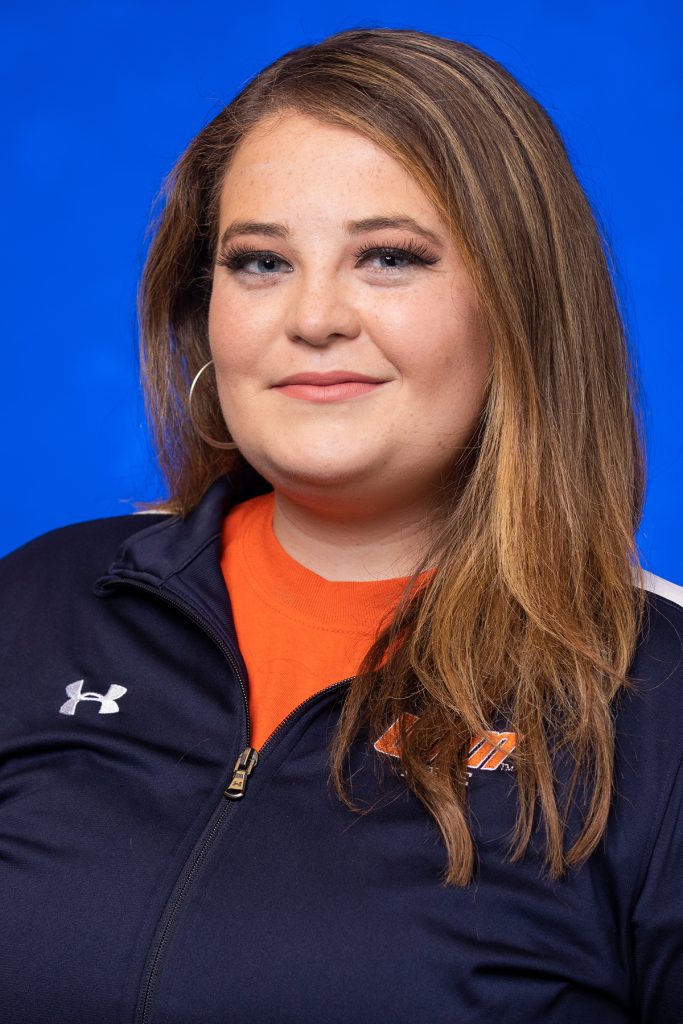
Favorite junior match you competed at? Why? My favorite junior match was probably when I did the NRA Camp at Camp Perry in July 2016, right before college rifle would start in August. I had NEVER shot any rifle except my trusty airgun, so I was overwhelmed by the new position adjustments for smallbore. I was so frustrated that I almost quit the Skyhawk Rifle team right then and there. I pushed through the entire week, through food poisoning from eating sushi for dinner and the Camp Perry weather. At the end of the week, I found out I placed fourth for the Dewer match. That was when I decided that I just might be cut out for college rifle.
Do you have a lucky charm that you have on the line with you when you are shooting? I have lucky socks that I wear to shoot. My boots are way too big, so sometimes I wear two pairs of lucky socks. My favorite pair of socks to shoot in is a pair I got from the Grand Canyon that has all the geologic rock layers in the walls of the canyon.
What is a practice day like for you? A practice day for me usually starts with me waking up SUPER early and drinking coffee. I am one of the very few shooters that cannot focus at all without my caffeine in the morning. I chug my coffee then go to work shooting. My coach usually tells me what to work on, and I get in my zone (or try really hard to get in the zone some days). I like to listen to meditation things before I shoot. I like the app “Headspace” before I shoot.
What has rifle taught you? Rifle has taught me how to find my focus. I have always been the kid that was never able to focus on anything because I had so many things going through my head. While I am shooting, I still have a million thoughts in my head, but I have learned through training how to silence some of them so I can take it shot by shot. Any additional comments/stories/advice you’d like to add? My sister shoots NCAA rifle as well! She is a freshmen at Georgia Southern and broke my career record in air rifle her freshmen year. I could not be prouder!